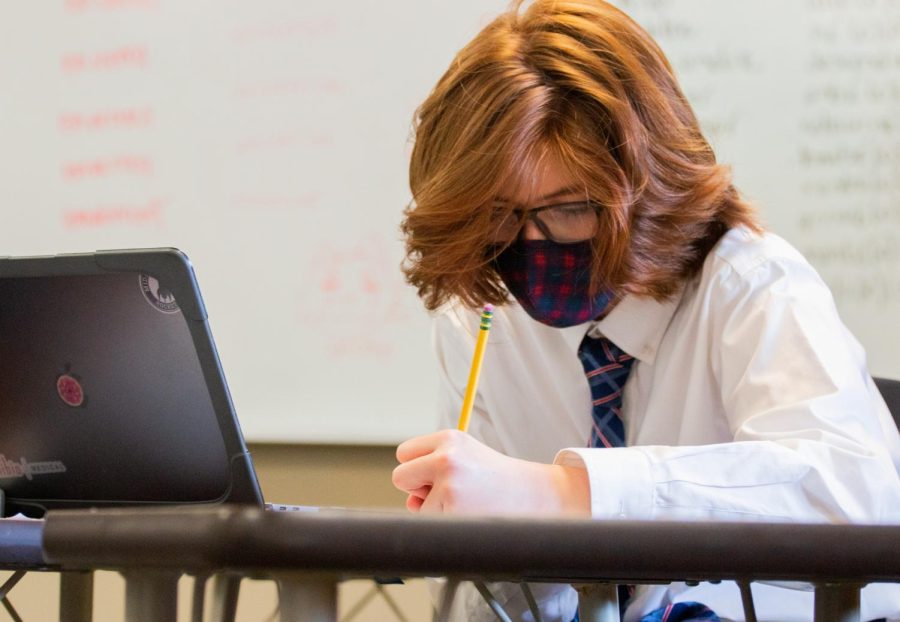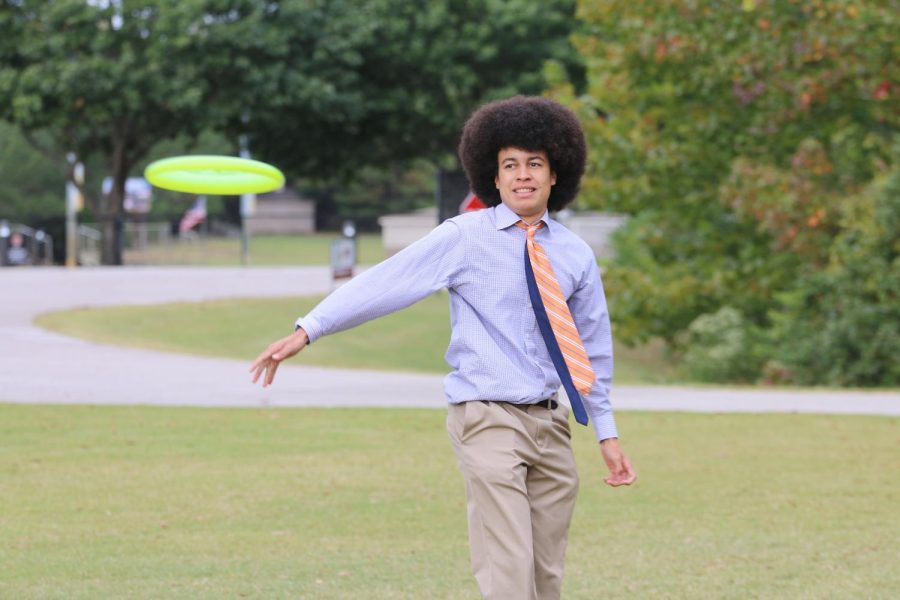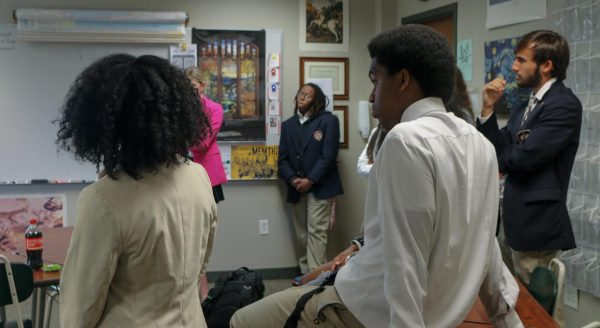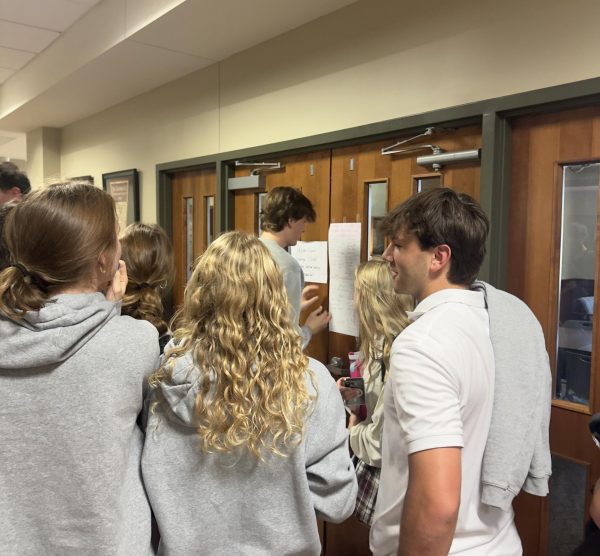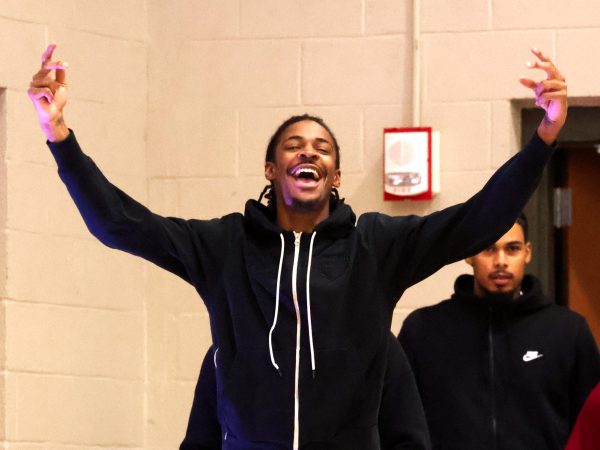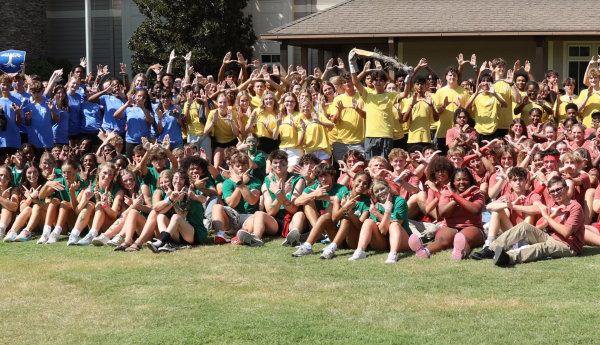Zooming Ahead
Online students return to campus with new view
Photo: Jack Seigerman
Eighth grade student Aiden Rubin de la Borbolla writes at his desk. Rubin de la Borbolla finds connectivity to be far better in-person.
It is Aug. 16, 2021: the first day of school for the year. Students are coming back to a campus that most haven’t set foot on since May. But there are also students who are coming back after being virtual for more than a whole year.
Back in March of 2020, along with many other schools, St. George’s Collierville campus shut down due to the safety and health concerns of the COVID-19 pandemic that took the world by storm. After being virtual for the remainder of that school year, most students went back to campus in-person for the 2020-2021 school year.
However, that was not the case for all of the students.
For a variety of reasons, some students decided to remain virtual for an additional year and continue their schooling through Zoom.
Now senior Isaiah Lewis was one of the students who decided to stay home where he completed his junior year as a virtual student due to his own health issues.
“The main reason I stayed home was actually, I mean, obviously COVID wasn’t safe, but it was my asthma,” Lewis said. “During the winter, when it gets really cold, my asthma picks up a bunch so it was like, I was taking my inhaler too much and so my doctor was like ‘Yeah, you might wanna stay home’.”
That choice came with its own struggles. Being over Zoom caused an inevitable distance between the students, class and teacher.
“There was a disconnect and there’s nothing you can do about that. I would wait until everyone stopped talking, and when I started talking there would be a few online students returning to campus with new view lag or something so someone else already stated they would stop, and I would just feel like ‘go ahead and finish.”
Teachers similarly felt a struggle with trying to teach students on Zoom and in-person simultaneously. Dr. Shelby Montague, who teaches upper school science, said she experienced difficulties trying to get virtual students’ voices heard in class.
“As a teacher, I felt like I wasn’t teaching good enough to anybody,” she said. “I had to sort of decide that I was going to teach the students in the room. Which meant that the students that were on Zoom, I would try to get to them, or try to make sure I would answer their questions,…[but] there are times where I would actively stop and ask ‘you know, someone online needs to answer the next question,’ and I wouldn’t be able to tell who was actually there. We would just be sitting in silence in the room.”
While Dr. Montague was struggling to get students to speak up, eighth grader Aiden Rubín de la Borbolla said that when he would try to ask or answer a question, he sometimes felt invisible.
“Because typically the teachers aren’t used to looking at the screen for answers so when I raised my hand a lot, I wouldn’t get noticed,” he said.
Senior Chloe Lewis (no relation to Isaiah Lewis) remembers how she would often rely on the chat for her questions and answers during her Zoom classes.
“I would usually put it in the chat box just cause I hate the way my voice sounds,” she said, “and sometimes on Zoom you can hear your echo, and I was also thinking about everybody else in the room hearing my voice, my anxiety got really high.”
Being virtual throughout the whole year caused other problems with staying focused. Isaiah Lewis said creating boundaries between relaxation and school got difficult.
“I don’t like working and relaxing at the same place because when I’m at home it’s so easy to not focus,” he said. “You relax at home, so it was easy because I had all my gaming stuff and all that was right there, and it was tempting.”
Time management felt easier for Chloe, who said she didn’t have much trouble with staying on task.
“I was able to remain focused for the majority of the school year,” she said, “but I know some students had a lot of trouble going virtual because it is hard to figure out how to manage your time well.”
Mrs. Pam Lewis, Chloe’s mother and the Collierville campus’s director of data management, said she was not worried about Chloe’s shift to virtual learning.
“She handled it amazingly,” she said. “She is very mature and so she did great. I know there are some kids that did not do so well because that environment just didn’t work for them. They were missing their friends; they were missing the interaction. The in-person instruction is better for some kids, but for her that wasn’t the case.”
Still, Chloe looked forward to seeing other students when she returned to campus, but she noted the difficulty that comes with reintegrating back into a community that she’d been gone from so long.
“I have to reintroduce myself to people that already know me,” she said. “Coming back into a school community that you’ve been a part of for so long after being gone for a year is very weird because they continue to move on even while you’re kind of separate and isolated from them.”
On the brighter side, she was happy to be back in person for her science classes.
Dr. Montague was also excited to have students back in the classroom as a crucial part of her curriculum involves experiments.
“Right now, I’m setting up more stuff to do more activities,” she said. “Last year with the protocols that we had, I basically didn’t do labs. But this year, we still have to adjust it, but at least we can do more because I don’t have to have it ready for virtual. I have everybody in person.”
Another activity that needs in-person interaction is robotics, and Isaiah was enthusiastic about getting back to it.
“We had a huge influx of people for robotics, which is nice because I guess it’s been a year, so everyone is coming back. We have 10 on our team—eight on our team is really big. It’s definitely good to finally be back at robotics, and this is my last year so we’ll definitely have to try to get to state.”
Reflecting back on what it was like to go virtual, Isaiah equates it to eating too much Chick-Fil-A.
“It’s kind of like if you like Chick-Fil-A, or something really good, and you get that over and over. You’re like, ‘oh, that’s great, I get Chick-Fil-A every day for lunch, but after day 50, you’re like ‘give me something else.”


